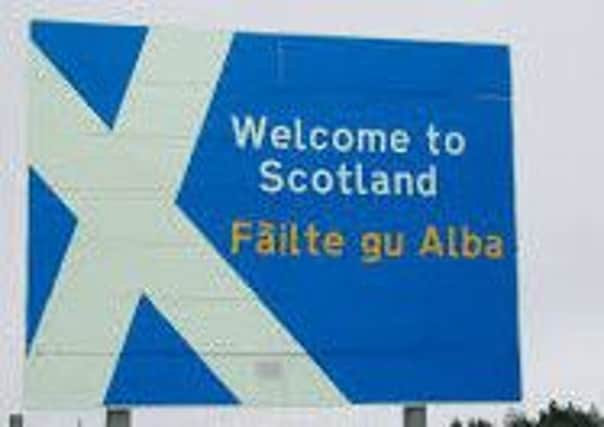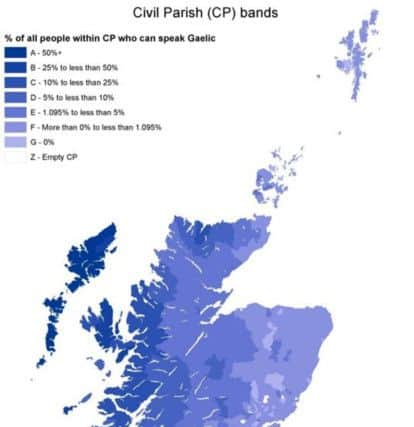Gaelic speakers born overseas boost language in Scotland


A second report on the 2011 Gaelic Census, released last week, has found a “notable” increase in speakers from new EU member states.
The overwhelming majority of the 56,500 Gaelic speakers in Scotland (95.6 per cent) were born in the UK
Advertisement
Hide AdHowever, the number of speakers from new EU countries has risen from 0.03 per cent in 2001 to 1.1 per cent in 2011.


The share from Africa also rose, from 0.2 per cent to 0.4 per cent, the census found.
Just under one per cent (0.9) of Gaelic speakers in Scotland were born in the Middle East or Asia.
A spokesman for Bòrd na Gàidhlig, which works to promote the Gaelic language in Scotland, said the rise in speakers from EU member states signalled an appreciation of bilingualism.
He said: “All these countries are fully aware of the benefits of bilingualism. These children might not be bilingual or even trilingual but their parents certainly will be and see the advantages of it.
“Although Scotland is finally grasping this fact, these countries are well ahead of us in terms of learning languages and the proven cognitive benefits of learning additional languages.
Advertisement
Hide Ad“They also appreciate that the Gaelic language has a wealth of culture and history that goes with it. Not only do you get the cognitive benefits, you also have access to over 2,000 years of history and culture.”
Meanwhile, the share of those born in the Republic of Ireland who speak Gaelic fell from 1.7 per cent to 0.7 per cent over the decade.
Advertisement
Hide AdHowever, those born in Ireland had the highest proportion of those with any skills in Gaelic (6.9 per cent), whether it be speaking, reading or writing Gaelic or understanding Scottish Gaelic.
The board spokesman said: “In Ireland, the have got a language that is almost identical to Scots Gaelic and it is compulsory for all children to learn the language as part of their schooling. They are well ahead of us in terms of education.”
The figures also show that 2.1 per cent of those born in the EU Accession countries and now living in Scotland reported having at least one Gaelic language skill compared to 1.7 per cent of those born in North America and 1.7 per cent of those born in the UK.
New data on the occupations of Gaelic speakers has also been released in the second report of the 2011 Census.
Knitters and weavers had the highest proportion of Gaelic speakers than any other group, at 14.1 per cent.
Gaelic names for colours of dyes and other equipment are still commonly used.
Advertisement
Hide AdDana Macphee, who is setting up Uist Wool, a new spinning mill and wool centre on the isle of Grimsay, said that Gaelic was still part of the fabric of life for many craftspeople.
She said: “Our workshops will tend to be a mix of people, some with Gaelic and there will be an informal passing on of words to describe particular actions. There will be a crossover of language between people of different ages.
Advertisement
Hide Ad“We do use some Gaelic words to describe the wool and give it an identity, that seems the most obvious thing to do.
“We understand that some of the people who we will market the wool to won’t understand what it means but we will explain that. It is just a very important party of our culture here.”
Meanwhile, Around eight percent of Marine operatives - or crewmen and women - recorded that they could speak Gaelic, according to the latest analysis of the 2011 Gaelic census.
Arts officers, producers and directors had the next highest proportion at 4.8 per cent of Gaelic speakers with musicians recording 3.6 per cent.
Amongst the clergy, 3.5 per cent speak Gaelic, with a further with 3.1 per cent of journalists and editors have skills in the Gaelic spoke word.
Industries where Gaelic speakers were proportionately more prevalent than people who do not speak Gaelic were agriculture, forestry and fishing, mining and quarrying, construction, transport and storage, Accommodation and food services, information and communication, public administration, education and human health and social work.
Advertisement
Hide AdTogether these industries contained 67.0 per cent of Gaelic speakers.
It was reported last month in the first census report that 87,100 people aged 3 and over in Scotland (1.7 per cent of the population) had some Gaelic language skills.
Advertisement
Hide AdWhile a slight decrease in Gaelic language skills has been recorded amongst the over 18 aged group, small increases are being recorded in younger people.
Around half of those with some Gaelic language ability live in three council areas - Highland, Eilean Siar and Glasgow City.
The proportion of people aged 3 and over with some Gaelic language skills was highest in Eilean
Siar (61 per cent), Highland (7 per cent) and Argyll & Bute (6 per cent).
Nationally, 25,000 people aged 3 and over reported using Gaelic at home in 2011 (0.49 per cent).
Of these, more than one in 10 (12 per cent) lived in households where no adults had any Gaelic language skills.